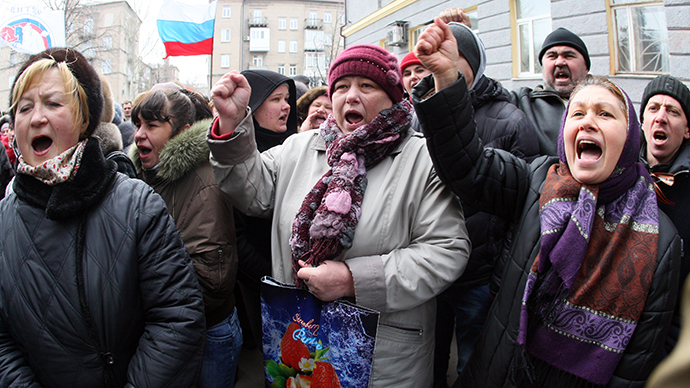‘West supports Ukrainian extremists by not speaking against them’

The US and the EU are being very one-sided on Ukraine when they should be very calm and evenhanded, and urge Kiev to try and make people in eastern Ukraine feel welcome in the country, Jonathan Steele, foreign correspondent of The Guardian, told RT.
RT:The US and the EU condemned the Russian parliament's decision to allow the sending in of troops, while asking for calm. Aren't they getting the opposite result?
Jonathan Steele: I think it's completely counterproductive, because it shows that they are very one-sided when for the moment outsiders should be very cool and calm and even-handed. Ukraine has been almost a divided country because of a long history, and the crucial thing is to try to keep Ukraine together. So the new authorities in Kiev must do all they can to make the Eastern Ukrainians feel welcome in Ukraine. And that means repealing this change of law which made it illegal for Russians to use their language as an official language in Eastern Ukraine. That was a disastrous first move by the new authorities in Kiev. They should go back from it immediately and Western countries should urge them to do so.
RT:Western powers say Ukraine needs to solve this on its own, yet were clearly involved in the Kiev protests. Why do they believe the entire country supports the self-proclaimed government?
JS: It's either cynicism or blindness. I think they know perfectly well that the Eastern Ukrainians are different from the West: Orthodox religion rather than Catholic, different language, mainly Russian, and different history – they were part of the Russian Empire, while the Western part was part of the Austria-Hungarian empire. So the whole thing is different, but they try to pretend that the new authorities in Kiev have a democratic mandate, which is certainly not the case.
RT:Yanukovich has now lost his authority, most Ukrainians don't trust him. But isn't there a legal procedure to remove somebody who has lost people's trust?
JS: Yanukovich has destroyed his own authority and legitimacy by fleeing the country. He made an agreement with the EU, on the Friday afternoon, which seemed to give him a lot of time, because the presidential elections were not going to be until much later this year and he just fled. He showed that he lost control. I think it will be very hard for him to come back. The more important thing is whether the Party of Regions which he was the head of continues – there have been some threats by the new authorities in Kiev to ban the party, which will be a further massive provocation to people in Eastern Ukraine losing their representation. So that's another thing the Western government should say: don't start banning political parties, have an inclusive government, government of national unity, and have a constitutional convention to work out new arrangements if necessary, possibly a federation. Maybe, Ukraine should be a federation like Canada, where we have the English-speaking and the French-speaking joining together in the federal parliament.
RT:If Crimea votes in a referendum for wider autonomy, would Brussels and Washington respect the decision?
JS: Probably not, because they say that the whole thing is illegal. But I think that the important point is that the referendum in question as far as we understand it is what you've said – greater autonomy. Nobody is saying as far as I'm aware that the referendum should be on independence for Crimea or on joining Russia. It's actually quite a mild referendum, just asking for a greater autonomy. Crimea already is known as an Autonomous Republic of Crimea, and it has a different status from any other area in Ukraine. So it's only a small step if they ask for more autonomy rather than independence which is not actually on the agenda.
The statements, views and opinions expressed in this column are solely those of the author and do not necessarily represent those of RT.












